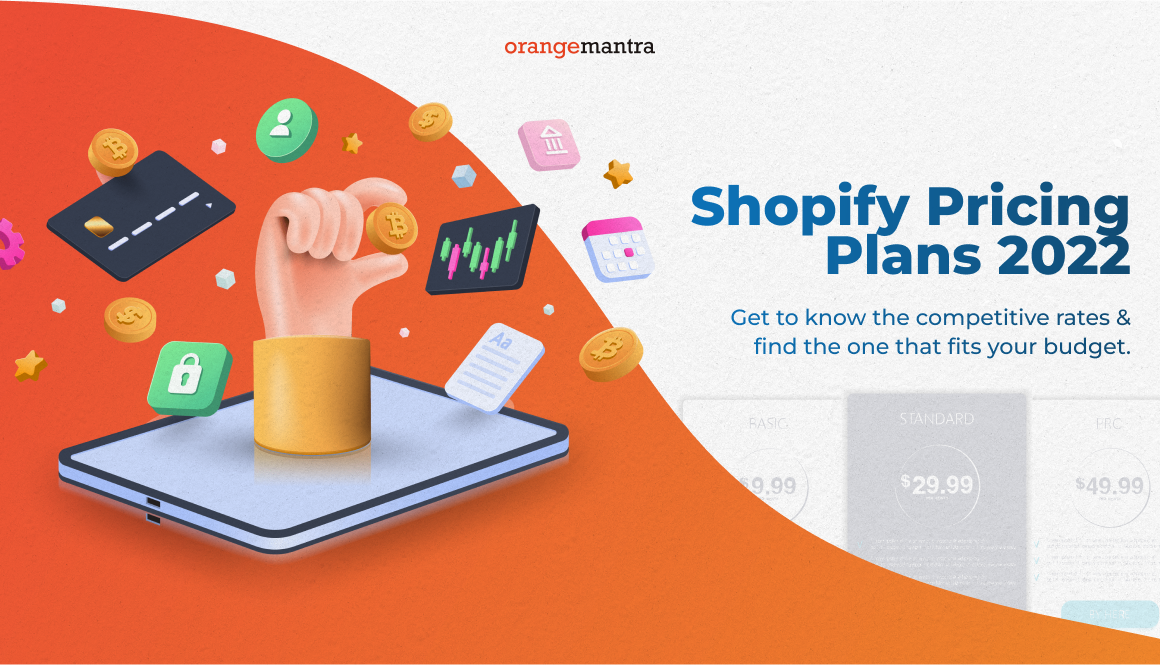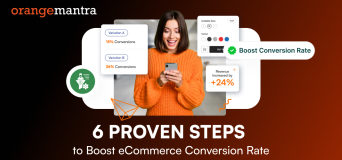If you own an online business or planning to start one, you must have heard about Shopify. A well-known name in the eCommerce world, Shopify has diverse pricing options. And if you’re considering using Shopify to sell products online, you’re probably aware of different price plans, as well. However, you’re mostly likely unsure which one is best for your business. So, here are some questions to consider before choosing a Shopify plan that perfectly matches your needs.
How Shopify Pricing Plans Help Online Retailers Grow Business
One of the most popular digital-commerce solutions, Shopify lets you create your custom online store. It operates in a web browser, so you can use it anywhere if you have Internet access. To put it another way, you don’t need to install any software to use Shopify, and since it’s a ‘hosted’ solution, you also don’t need to worry about purchasing hosting. The specific functionality you receive from Shopify varies on the pricing plan. But all Shopify pricing plans allow you to sell an unlimited number of products to set up your store.
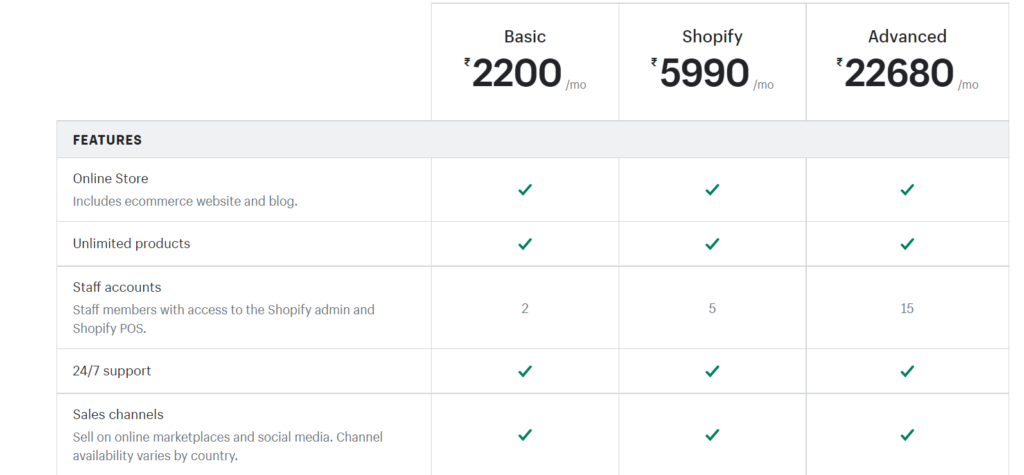
Things to Consider Before Selecting a Shopify Pricing Plan
Here a few a few things to keep in mind before zeroing in on a Shopify pricing plan.
- What is your average order value?
- How many orders have you received?
- What characteristics are you looking for?
- What functionalities aren’t required?
- What features are you going to require?
Let’s now see how these questions affect your Shopify price plan.
What is your average order value?
With a higher Shopify plan, stores with more monthly orders and a higher AOV will pay less. Stores with fewer orders and smaller cart sizes, on the other hand, are likely to benefit from one of the Shopify pricing plans for eCommerce.
Let’s look at an example of how this might work.
- Store A is a smaller store with fewer transactions and lower monthly income.
- Monthly revenue average: $1,500
- The monthly average number of orders: 50
- $30 is the average cart value.
Store A would pay $87.50 per month for Shopify Basic and $350 for Shopify Advanced based on these figures. For a tiny store, this is an obvious choice.
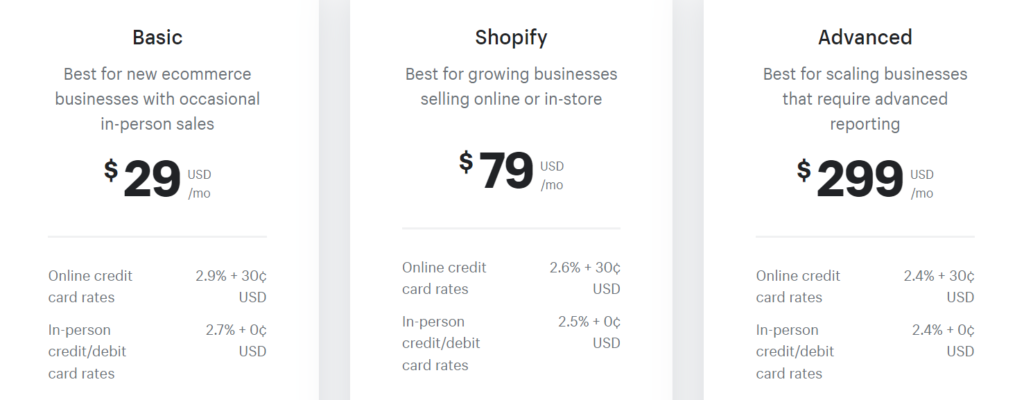
What characteristics are you looking for in your business?
Examine which package provides you with all you require to run your business right now. Consider the things you didn’t think of but, that would be useful in the future. Although you may have been able to get by without them in the past, they may be worth the cost as your business grows.
What kind of must-have eCommerce features you need?
Feature-rich designs can sometimes result in bloat and a clunky experience if you’re not prepared. You make your customers think, “I just bought a couch, why are they recommending another one?” instead of landing an upsell. Avoid being distracted by bright stuff and be honest with yourself about what you will and will not utilize. With the right Shopify eCommerce development process in place, you could get the desired UX for your online store. But first, you need to understand how different Shopify pricing plans come with unique offerings.
Shopify Lite
Shopify Lite is the cheapest Shopify option because it is the most basic. It’s for small businesses who wish to integrate Shopify functionality into their social media accounts or add “purchase” buttons to an existing website or blog, such as a WordPress site. Shopify Lite also includes Facebook Messenger, which adds a customer assistance component to the service. The Lite goal is to add functionality to your existing site or blog rather than turning it into a full-fledged Shopify store setup.
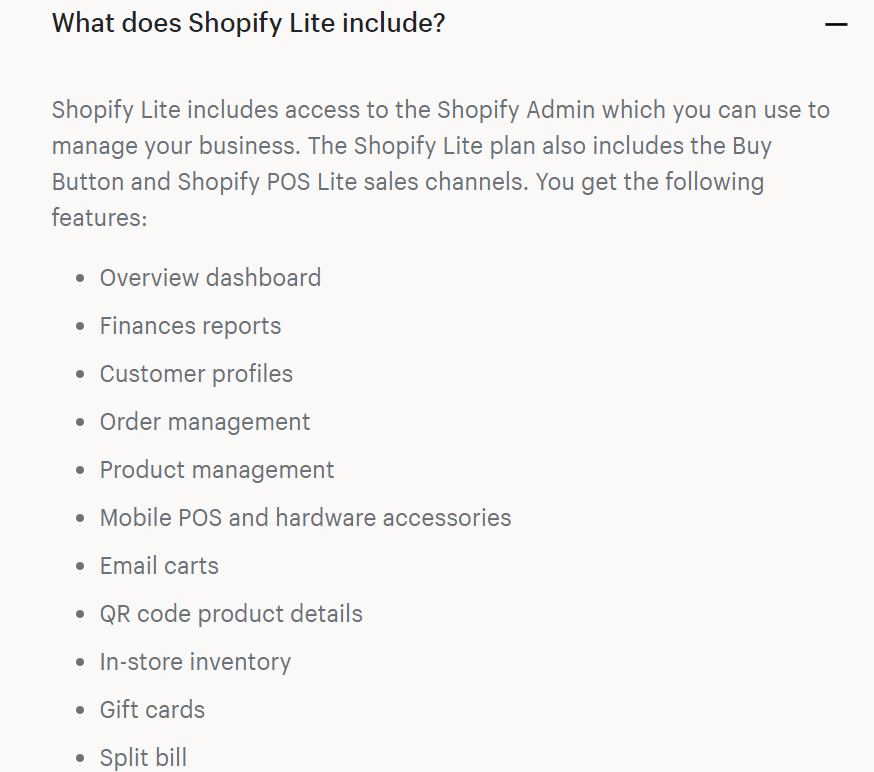
Shopify Basic
The Shopify Basic price plan is the minimum for starting your own eCommerce business. You’ll get a Shopify-hosted store as well as blog features. It gives you access to Shopify’s fraud risk analysis tool and the option to sell an unlimited number of products.
Price: $29 per month.
Shopify charges some of the lowest costs in the business, giving you ultimate control over your earnings. It is an excellent choice for merchants who want a professional-looking, fully functional web store but are willing to refrain from some of the Shopify Plan’s features.
The ‘Shopify’ Plan
It includes 24-hour customer service, Shopify’s fraud risk tool, discount codes, and a free SSL certificate. You can collect the contact information of people who have shown interest in your items but did not purchase them and then send them an email with a discount code or a reminder to try to close the sale.
Depending on your product prices, one or two recovered sales will cover the difference in price between Shopify Basic and Shopify.
Price: Monthly fees are $79.
Although this may appear to be a significant step up from the Basic Shopify plan, retrieving shopping carts is incredibly effective. Shopping cart recovery is an excellent technique to capture and convert potential consumers.
Shopify Advanced
The Shopify Advanced plan is a more advanced version of the basic Shopify product. The most notable enhancements are 15 new employee accounts and third-party shipping calculations. It is for companies that ship enough products that outsourcing delivery makes sense. Advanced reporting is also available to you. It is intended for stores that offer several products and want to create data for collections or product kinds.
Price: Monthly fees are $299.
You’re getting a lot of bang for your buck. It is for established firms who have had some eCommerce success and wish to expand their reach. It’s a terrific alternative for businesses that sell in large quantities and need a third party to handle product shipment.
Shopify Plus
There are no transaction costs with the Plus solution. There isn’t a standard price for Shopify Plus plans like there is for the other tiers. The Shopify Plus cost, on the other hand, starts at around $2,000 per month (around £1,640).
Choosing a payment gateway
Another thing to think about is which payment gateway your store will utilize. Shopify Payments is a feature of Shopify customer support that helps store owners save money. If you process your credit cards through an external gateway, you will be charged their costs and an additional transaction fee from Shopify.
You can, however, have both Shopify Payments for credit cards and PayPal Express enabled on time, and Shopify will not charge you the additional transaction costs.
The following is a list of third-party fees:
3.4 percent + 20p for PayPal
2.75 percent + 20p Worldpay
Sagepay offers three Shopify pricing plan options: £19.95 per month for up to 350 transactions, £45 per month for 500 transactions, and a custom pricing plan for larger businesses.
Apps for Shopify
The platform includes a lot of built-in capability, as you can see from the features stated in the various Shopify price plans. However, thanks to Shopify’s global network of app developers and agencies, there is a robust app ecosystem. Hundreds of free and paid applications are available in the Shopify app store to help you enhance and personalize your store in various ways. It’s important to factor in the different apps available as part of your store’s operating costs because while many are free, others require a membership.
Purchasing a pre-built Shopify store
In addition to subscribing to one of the five plans described in this article, the Exchange Marketplace allows you to purchase an existing Shopify store. Before being listed on Shopify, these stores are validated. These stores can range in price from a few hundred dollars to millions of dollars, depending on the sales they generate and their existing customer base.
When is the best time to switch Shopify pricing plans?
If you’re just getting started, we recommend starting with the Basic Shopify price plan and working your way up as your business grows and your eCommerce store requires more features – and your sales and revenue show that you can afford it.
Which Shopify pricing plan is the most appropriate for you?
Stick with the Basic Plan if your monthly revenue is less than $5,000. If your monthly income exceeds $5,000, you should upgrade to the Shopify plan. If your account balance exceeds $10,000, you should consider subscribing to the Advanced Plan.
Conclusion
You might find it challenging to find the best Shopify pricing plan for your business. At first glance, it’s difficult to tell what you need and don’t need. Above mentioned questions and ideas in this article, on the other hand, should lead you in the right way. Shopify Lite can provide you access to rudimentary online selling tools if you have your website and wish to turn on eCommerce functionality. For more consideration, consult Shopify experts. You might also consider hiring Shopify developers for your project. We offer end-to-end Shopify-based services for all kinds of online eCommerce requirements.
FAQs
What are Shopify Payments, and how can I use them?
The payment gateway for Shopify. You won’t be charged any additional costs on top of the credit card fees if you use this method.
How long do Shopify contracts last?
Unless you sign up for an annual or two-year plan, you’ll be on a month-to-month basis.
Is there a discount on the plans?
On annual plans, a 10% discount is available if paid in advance, and a 20% discount is available on two-year plans if purchased in advance.
What is the ideal Shopify plan for a new store?
Start with the Basic Plan if your monthly revenue is between $0 and $5,000. If your monthly income exceeds $5,000, you should upgrade to the Shopify plan.
Is Shopify less expensive than Magento?
Magento is an open-source platform, so the price will vary depending on your needs, but Shopify has three set price plans that are less expensive.
How many members of my team will access the Shopify store?
Two staff accounts are allowed in Shopify’s basic version. Advanced Shopify allows for a total of 15 user accounts.
